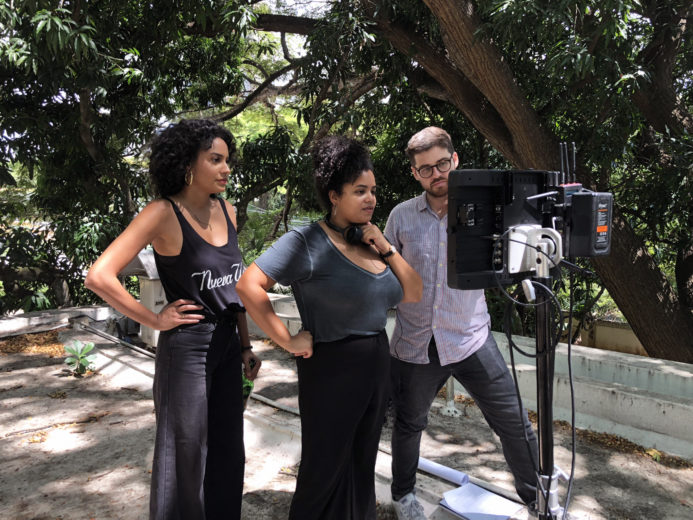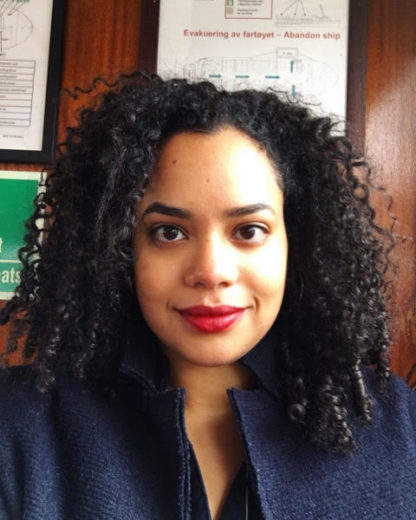First-generation Americans know all too well the struggles of trying to maintain a connection with their parents’ native land. De Lo Mío, a film written and directed by first-time filmmaker, Diana Peralta, explores this struggle through a touching and compelling story. Premiering at the BAMCinemaFest in New York City on June 22nd, the film tells the story of two sisters, Carolina and Rita (played by Darlene Demorizi and Sasha Merci, respectively), who travel to Santiago, Dominican Republic, to reunite with their estranged half-brother, Dante (played by Héctor Aníbal), in order to sell their family home after their father passes away. In doing so, the siblings share light-hearted moments and family blow ups as the sister’s cope with the loss—not only of their father—but their family’s home and, along with it, the last remaining connection to the island.
‘LLERO caught up with the film’s writer-director to gain some insight on the inspiration behind De Lo Mío, the film’s induction into the BAMcinemaFest, Latino representation in film, and the importance of female filmmakers.

‘LLERO: What was it that moved you to film De Lo Mío?
Diana Peralta: I had been writing this script for a long time. It was inspired by my summers in Santiago—staying with my grandparents, loving just being there, and loving the space, and not seeing enough of that type of world on film. I always knew that there was a story there that I needed to capture—just to capture this gorgeous place and this amazing culture on film. But, I had kind of been dragging my feet for because I was working full-time in advertising and it took over my life, so filming kind of took a backseat for a little bit.
Then, one day, we found out that my grandmother had cancer. I found out that she wasn’t going to make it, so that was kind of my urgent deadline to get this thing done. My grandmother passed away last February, and that was kind of my mental breakdown. I was thinking: We need to do this before we lose the house, and also in her honor. And, that gave me the courage to quit my full-time job, and get this thing done. It was all because of this terrible thing that happened, but at the end of the day, I feel like my grandma gave me the strength to pull it together. It was one of those real-life things that make you wake up.
‘LL: Tell us a bit about the storyline of De Lo Mío.
DP: It’s a story about these two-super close, Dominican York sisters who make their way to Santiago after not being there for many, many years to reunite with their estranged half-brother who was born and raised in Santiago and never left. They are reuniting to empty out their late father’s home because their father passed away, so they’re getting together to clean out the space and sell it. In the process, they’re kind of joyously reuniting as siblings, but also dealing with the loss that they experienced, and kind of dealing with the loss of the girls’ connections with the motherland.
It’s a little bit of a family drama/comedy. Dominicans are joyous, loving people. They’ll deal with the hardest things through comedy. You’ll be crying but saying jokes at the same time. That’s just how we are. It’s the kind of story where you’ll say, “I’m really sad right now, but I’m smiling and laughing at the same time. That’s really what I wanted to get across, because that’s the culture.
‘LL: To an immigrant who has family overseas, will the story told in De Lo Mío feel like a real-life story?
DP: I just think that’s just something that a lot of us first-generation people experience, when our families are divided in different countries or across borders. You always have to struggle with that thought of: How do I stay connected to my family? How do I stay connected to my culture when I’m not there? And, what does it mean for the people that were sort of left behind who didn’t have the opportunity to see what else is out there? For me, that was just the story that I ran into so many times with my family and my friends who are first-gen and caught between both countries. I feel that even though it’s personal to me, it’s pretty universal and that a lot of people can relate to that.
‘LL: What’s do you hope the audience will walk away with after watching the film?
DP: I would say that I would want people to want to call their grandma [laughs]. Let’s not take this for granted. It’s easy to lose touch with your family and family drama happens, and you want to run away and not deal with it—but you don’t realize what you’ve lost until it’s gone. Then, you’re like, “Damn. I should have really said that one thing or have tried to do better to make our relationship stronger.” That’s what I was dealing with, the loss with that connection. If people could really take a moment to realize that that’s a really beautiful thing to be of two places and to be tied to people of other worlds, and just to try to maintain that connection.
‘LL: De Lo Mío will be featured in the BAMcinemaFest. Tell us a bit about how you got involved with the festival.
DP: BAM is an incredible festival that I’ve been following for a few years. I have had people I’ve worked with on-set have their films premiered there, and I’ve always known that it’s an amazing center for independent films. I’m a New Yorker, it’s my hometown. [Sasha Merci and Darlene Demorizi] who play the sisters in the film are New Yorkers as well. It’s nice to show our film in our hometown. That was always my dream, but I never expected my little movie to go anywhere. When I got the call from BAM, I was just blown away by how supportive they were. They were just so excited to see the story told in this unique way, in this unique lens, and they wanted to celebrate the film by featuring us as the closing night, which is such an honor.

‘LL: We were hoping to get your view on Latino representation in the film industry. Do you think Latinos are properly represented in films and television today?
DP: I, personally, think it’s getting better. Even five years ago, you didn’t have complex Latino characters onscreen. I thought that we were always being put into a corner, into a stereotype. But, with shows like Vida, or even with the work that Sasha and Darlene are doing on Instagram, it’s really beautiful to see that finally our stories are being told as real-life, human stories, and not as a tool for someone else’s narrative. I think it’s getting better. I think it can keep getting better—especially in showing diversity in Latinos. A lot of Afro-Latinos are still not represented, and that’s something that I’m really passionate about. I think that people that are coming up are making a big difference and, it’s getting better for sure, but we can always do more.
‘LL: What sort of stories relating to the Latinos experience do you wish you could see more of out there?
DP: I feel like we get a lot of the stereotypes—like the mobster, or the gangster, or the maid in the telenovelas. I just find that sometimes the most everyday stories are the most beautiful and the most relatable, and I would just love to see some real, human, deep, Latino characters.
‘LL: How important do you believe it is for women to take on more behind-the-camera roles in television and film?
DP: I think it’s so important. There are a lot of amazing women out there who are doing their thing, but there’s not enough. I think the more women we have out there, the better our stories are—the more empathetic our stories are—because it’s a whole perspective that’s not elevated yet. Ava DuVernay is one of the most amazing filmmakers of our lifetime, and I love hearing what she has to say and seeing her perspective. She’s a huge inspiration for me. Having more women like her just opens up a whole new perspective that isn’t present right now. We definitely need more of that. There are definitely tons of women out there doing it right now. We just need to celebrate them and elevate them more as well.
‘LL: Any advice you’d like to offer to anyone reading this who may be looking to get into the film industry?
DP: Just do it. This is my first film, so I kind of didn’t know what I was doing. I had all the anxiety in the world, but the mantra that I would tell myself was “Feel the fear and do it anyway.” The fear will melt away as you go. Just be brave and do it. And, don’t wait for people’s permission. That’s basically what I told myself when I was having a meltdown every day [laughs]. That’s basically how I got through it, so hopefully that will help someone else [laughs].
To find out where you can catch De Lo Mío, visit peraltafilms.com or instagram.com/samambaia.
